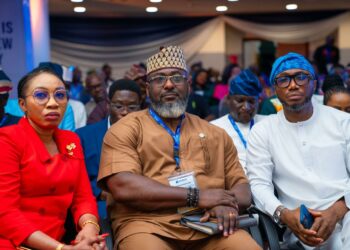Boosting Submarine Cable Capacity In Nigeria
BY ROYAL IBEH
Global internet consumption is dramatically increasing due to a greater reliance on remote work and online communication. This is even as studies have shown that good internet access empowers individuals, opens doors, and boosts national and international economies, hence the reason why it is so crucial that a country has extensive, dependable internet connectivity and infrastructure.
To this end, major countries of the world, including Nigeria, are gearing up to putting the necessary structures in place to boost submarine cable capacity.
For instance, the Nigerian Communications Commission (NCC) averred that the telecommunications industry had embarked on a remarkable growth trajectory, solidifying its position as an engine of economic growth, in recent years.
“The enhancement of digital access and the expansion of our networks have left an indelible impact on the lives of our citizens,” the Commission posited.
However, more still needs to be done considering the Network Readiness Index (NRI) ranking for 2022, which puts Nigeria in 109th out of 131 countries.
One way to improve the NRI ranking of Nigeria is through the undersea or submarine cables, which, according to reports, carry bulk capacity for Internet access across continents.
As of April 2022, there are seven international submarine cables in Nigeria, which are submarine cables owned by Natcom Development and Investment Limited, trading as ntel, with a capacity of 800 gigabits; MainOne cable, with a capacity of 10 terabits, and Glo-1 or Globacom-1 cable, owned by Globacom Limited, with a capacity of 2.5 terabits.
Others are the African Coast to Europe submarine cable by the Dolphin consortium that includes Dolphin Telecom, Orange, MTN, and others, with a total capacity of 12.8 terabits; West African Cable System by MTN, with a capacity of 14.5 terabits; Nigeria-Cameroon Submarine Cable System owned by Cameroon Telecommunications (CAMTEL), in partnership with MainOne, with a capacity of 12.8 terabits and Equiano, owned by Google LLC and the West Indian Ocean Cable Company (WIOCC), with a capacity of 100 terabits.
The latest is Meta’s 2Africa subsea cable expecting to land in the Nigerian cities of Lagos and Akwa Ibom. At 45,000 kilometers long, the 2Africa submarine cable will be one of the world’s largest subsea cable projects and will interconnect Europe (eastward via Egypt), Asia (via Saudi Arabia), and Africa, and it is expected to go live before the end of 2023, delivering more than the total combined capacity of all subsea cables currently serving Africa, with a design capacity of up to 180 terabytes per second (Tbps).
Meta’s vice president for Africa, the Middle-East and Turkey, Kojo Boakye, said Meta, through a consortium, plans to land 2Africa cable simultaneously in Lagos and Akwa-Ibom States to ensure those not yet connected are connected while those already connected are given an opportunity for enhanced and affordable access.
Boakye, however, solicited NCC’s support in sailing through all necessary legal and regulatory hurdles in landing the submarine cable to complement existing backbone infrastructure in Nigeria.
Benefits of submarine cables
Undersea cables, also known as submarine cables, link to the nation through landing stations, from which Internet service providers (ISPs) and telecom operators receive broadband capacity, which they then resell to end users and subscribers as data plans. With a mobile network or a Wi-Fi hotspot, this last-mile transmission to end-users can be done wirelessly or by cable.
The way submarine cables are laid makes them less vulnerable to weather-related outages. They also transmit data at extremely fast speeds, making it possible for ISPs to deliver faster internet service. In addition, the availability of bulk capacity drives the lower unit cost of internet service in the connected countries.
According to the Association of Submarine Cable Operators of Nigeria (ASCON), there are about 1.5 million kilometers of optic subsea cables globally, connecting almost all the countries of the world for the purpose of transmitting communication signals, whether it is internet traffic, voice, or data.
“A single submarine cable has a capacity of 30 million voice channels, which means it can take a minimum of 30 million telephone calls simultaneously; if you multiply that by the number of submarine cables in existence, that is huge. It is superfast, it is more reliable, very economical and it is resilient.
“The cables we have today are responsible for over 95 per cent of the internet, communications, and broadband connectivity we enjoy in Nigeria today. This covers activities ranging from sending and receiving emails, surfing the internet, streaming and downloading music, videos and other digital content, teleconferencing, social media engagements, banking and financial market transactions, various electronic commerce activities, phone calls, international communications, telemedicine and long-distance education, among others,” the Association averred.
Maida Promises more Support for Undersea Cable Initiative
With these benefits, the executive vice chairman and chief executive officer (EVC/CEO) of the NCC, Dr. Aminu Maida, has pledged the support of the Commission to law-abiding investors like Meta (formerly Facebook), which responded positively to Nigeria’s desire for investments that would promote the agenda of government to achieve a robust digital economy.
Maida, who spoke when he received a delegation of Meta, led by the company’s Vice President for Africa, the Middle-East and Turkey, Kojo Boakye, when they visited NCC’s headquarters in Abuja, said the regulatory support to all investors, including operators in Nigeria, would be predicated on their playing by the rules and regulations guiding the sector.
He said the commission places a lot of premium on compliance with industry laws, regulations, and guidelines as such will also engender a level-playing field for all licensees and other stakeholders in the industry for sustaining healthy competition and guaranteeing sustainable growth in the Nigerian telecoms sector.
While NCC has promised to support more submarine cable initiatives, ASCON, however, advised that subsea communication assets have to be protected at all costs, as they are the arteries and gateways to Nigeria’s economic growth.
It said that Nigeria’s total international connectivity capacity arriving at its borders in Lagos is more than 40 terabits per second. While acknowledging with dismay that the nation does not have the necessary terrestrial infrastructure to transport this capacity from the coastlines across the nation, especially to the unserved and underserved areas, it posited that the country does not use more than 10 per cent of its total cable capacity.
“The relevant national backbone is not available. That is the challenge we are currently facing with broadband penetration. Thus, the connectivity and speed people will experience in Lagos will be totally different from what they find in their villages. To tackle this challenge, we recommend that NCC must collaborate with other telecommunication stakeholders in seeking government intervention,” it stated.





